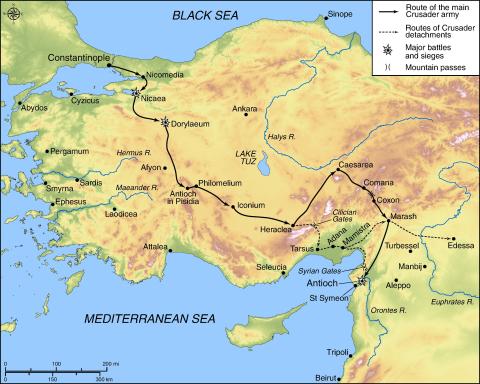The Road to Antioch
[4.10.1] Postquam vērō Turcī, inimīcī Deī et sānctae Chrīstiānitātis, omnīnō fuērunt dēvictī, per quattuor diēs et noctēs fugientēs hūc et illūc, contigit ut Solimānus dux illōrum, fīlius Solimānī veteris, fugeret dē Nīcēā. Quī invēnit decem mīlia Arabum, quī dīxērunt eī: “Ō īnfēlīx et īnfēlīcior omnibus gentīlibus, cūr tremefactus fugis?” Quibus Solimānus lacrimābiliter respondit: “Quoniam ōlim cum habuissem omnēs Francōs dēvictōs, eōsque putārem iam in captīvitāte ligātōs, dum paulātim voluissem ligāre adinvicem, tunc respiciēns retrō, vīdī tam innumerābilem gentem eōrum, ut sī vōs aut aliquis illīc adesset, putāret quod omnēs montēs et collēs vallēsque et omnia plāna loca plēna essent illōrum multitūdine. Nōs igitur, illōs cernentēs, statim coepimus capere subitāneum iter, timentēs tam mīrābiliter, ut vix ēvāserimus dē illōrum manibus, unde adhūc in nimiō terrōre sumus. Et sī mihi et verbīs meīs vellētis crēdere, auferrētis vōs hinc, quia sī et ipsī potuerint vōs sōlummodo scīre, ūnus ex vōbīs vix amplius ēvādet vīvēns.” At illī audientēs tālia, retrōrsum vertērunt dorsa, et sē expandērunt per ūniversam Rōmāniam.
notes
(July 1097) The Turks flee. Our author gives an imaginary account of what their leader, Kilij Arslan, told a contingent of Arab allies.
Solimānus: Kilij Arslan, the Seljuk sultan of Rum, called "Suleiman" by our author, perhaps confusing him with his father.
fīlius Solimānī veteris: Suleiman ibn Outulmish, founder of the Sultanate of Rum.
quī dīxērunt eī: the antecedent is decem mīlia Arabum.
omnibus gentīlibus: “than all (other) foreigners''; ablative of comparison. gentilis gentile only rarely means “foreigner” in CL, but the meaning is frequent in LL and ML, especially the Vulgate, where it means “gentiles” (i.e., non-Jews or pagans). Our author makes no effort to give Kilij Arslan the vocabulary appropriate for a Muslim.
Quoniam: quoniam in ML can be used like quotation marks; omit in translation.
habuissem: when he thought he had them; unless habeo here means “regard."
dum paulātim voluissem ligāre adinvicem: "although I for a little bit wanted to bind them up in pairs." Our author often has his Muslim characters speak in ways that are odd, perhaps in imitation of a their supposedly florid language.
sī mihi … vellētis crēdere, auferrētis: present contrary to fact condition (AG § 517), used because Suleiman does not expect to be believed, even though he is.
quia sī et ipsī potuerint vōs sōlummodo scīre: "if they themselves can only know that you (are here)."
ūnus ex vōbīs vix: “barely one of you.”
per ūniversam Rōmāniam: i.e., through all of the formerly Byzantine lands now held by the Turks.
vocabulary
contingō contingere contigī contactum: to arrive at; (3rd sing. can be impersonal) it happens that (with ut + subj., OLD 8c).
paulātim: gradually, bit by bit
adinvicem: with one another, in pairs
unde: wherefore, and so (used to connect sentences, OLD 7b.)
adhūc: furthermore (OLD 8)
subitāneus –a –um: sudden
sōlummodo: only
amplius: anymore, for long (OLD 5b)
expandō, expandere, expandī, expassum or expansum: to spread out

